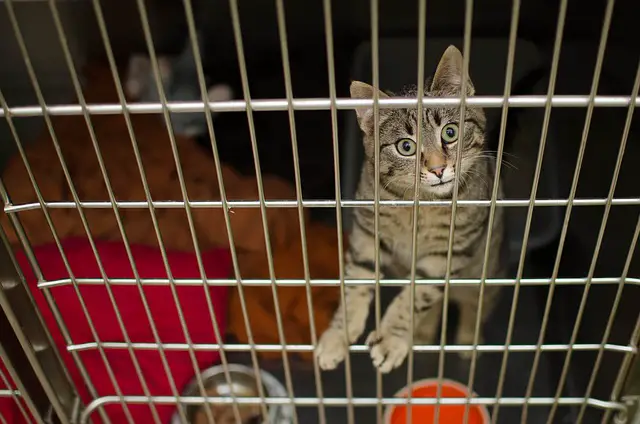If you’re a cat owner, you’ve probably wondered at some point whether or not it’s okay to keep your cat in a cage. After all, cats are notoriously independent creatures and often seem unhappy when confined to small spaces. So, what’s the verdict? Should you keep your cat in a cage? First, let’s take a look at the pros and cons.
Do cats belong in cages?
There are a variety of opinions on whether cats should be kept in cages. As an experienced cat owner, I believe that there are both pros and cons to this practice.
On the one hand, some cats feel more secure in a small space where they can see all around them. But on the other hand, this can be helpful for shy or anxious cats.
It can also be helpful for indoor cats who need to be safely contained while their owner is away.
On the other hand, however, most cats prefer to have some room to move around and explore.
Keeping a cat in a cage can be stressful and may lead to behavioral problems such as excessive meowing or biting. Therefore, weighing your cat’s needs before deciding whether to keep them in a cage is essential.
The Pros of Keeping Your Cat in a Cage
There are several benefits to keeping your cat in a cage.
First of all, it can help to keep them safe. For example, if you have an indoor cat, a cage can prevent them from getting outside and potentially getting lost or hurt. Additionally, if you have other pets in the house (such as dogs), a cage can provide your cat with a safe place to retreat when they feel threatened.
Another benefit of keeping your cat in a cage is that it can help to contain its messes.
Cats are notoriously messy eaters, and if you don’t want your floors covered in food scraps and Kitty litter, confining them to a small space can help.
Finally, caging your cat can also be helpful if you’re potty training them; it will allow you to confine them to a tiny area until they get the hang of using the litter box.
The Cons of Keeping Your Cat in a Cage
Of course, there are also some drawbacks to keeping your cat in a cage. The most obvious is that cats hate being confined to small spaces; it goes against their instincts.
As a result, caging your cat can cause them a great deal of stress, which can lead to health problems down the road.
Additionally, if your cat feels trapped and helpless, it may become aggressive or lash out—which isn’t suitable for anyone involved.
Do cats like to be in cages?
While some cats may enjoy the security of a cage or kennel, most prefer a free range of their home. After all, cats are natural hunters and climbers, so being confined to a small space can be pretty frustrating for them.
In addition, cats are spotless animals and typically dislike being in close quarters with their waste.
For these reasons, it’s essential to provide your cat with plenty of toys and play space to keep them happy and healthy.
If you do need to put your cat in a cage or kennel, make sure to give them plenty of time out of it to stretch their legs.
What size of cage for a cat?
The cage size for a cat will vary depending on the breed and age of the cat. Generally, a larger cage is better as it gives the cat more room to move around and explore.
However, if the cage is too large, the cat may feel overwhelmed and stressed.
It is essential to balance giving the cat enough space to feel comfortable and providing enough enclosure to help the cat feel safe.
A good rule of thumb is to choose a cage that is at least twice the size of the cat’s body.
For example, a cage 2 feet by 4 feet would be appropriate for a medium-sized cat.
Ultimately, it is up to the owner to decide what size cage is best for their pet.
Conclusion
So, should you keep your cat in a cage? Ultimately, that decision is up to you. If you decide to cage your cat, ensure that the cage is large enough for them to move around comfortably and that there’s plenty of ventilation so they don’t overheat. You should also avoid leaving them in the cage for extended periods; give them some time out of the cage every day so they can stretch their legs (and claws).
[su_box title=”Affiliate Disclosure”]This website is supported by its readers. Please assume that all links are affiliate links. If you make a purchase from one of the links we will make a commission from Amazon. Thank you.[/su_box]




